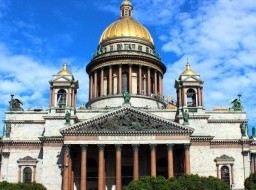Yonghe (Lama) Temple
This exceptional temple is a glittering attraction in Běijīng’s Buddhist firmament. If you only have time for one temple (the Temple of Heaven isn’t really a temple) make it this one, where riveting roofs, fabulous frescoes, magnificent decorative arches, tapestries, eye-popping carpentry, Tibetan prayer wheels, tantric statues and a superb pair of Chinese lions mingle with dense clouds of incense. The most renowned Tibetan Buddhist temple outside Tibet, the Lama Temple was converted to a lamasery in 1744 after serving as the former residence of Emperor Yong Zheng. While the temple is an active place of worship, and you may occasionally see pilgrims prostrating themselves in submission at full length within its halls, the temple is mostly visited by tourists these days. Resplendent within the Hall of the Wheel of the Law (Fǎlún Diàn), the fourth hall you reach from the entrance, is a substantial bronze statue of a benign and smiling Tsong Khapa (1357–1419), founder of the Gelugpa or Yellow Hat sect, robed in yellow and illuminated by a skylight. The fifth hall, the Wànfú Pavilion (Wànfú Gé), houses a magnificent 18m-high statue of the Maitreya Buddha in his Tibetan form, clothed in yellow satin and reputedly sculpted from a single block of sandalwood. Each of the Bodhisattva’s toes is the size of a pillow. Behind the statue is the Vault of Avalokiteshvara, from where a diminutive and blue-faced statue of Guanyin peeks out. The Wànfú Pavilion is linked by an overhead walkway to the Yánsuí Pavilion (Yánsuí Gé), which encloses a huge lotus flower that revolves to reveal an effigy of the Longevity Buddha. Don’t miss the collection of bronze Tibetan Buddhist statues within the Jiètái Lóu, a small side hall. Most effigies date from the Qing dynasty, from languorous renditions of Green Tara and White Tara to exotic, tantric pieces (such as Samvara) and figurines of the fierce-looking Mahakala. Also peruse the collection of Tibetan Buddhist ornaments within the Bānchán Lóu, another side hall, where an array of dorje (Tibetan sceptres), mandalas and tantric figures are displayed along with an impressive selection of ceremonial robes in silk and satin. The street outside the temple entrance heaves with shops piled high with statues of Buddha, talismans, Buddhist charms, incense and keepsakes, picked over by a constant stream of pilgrims. |




